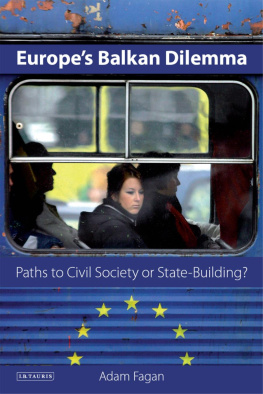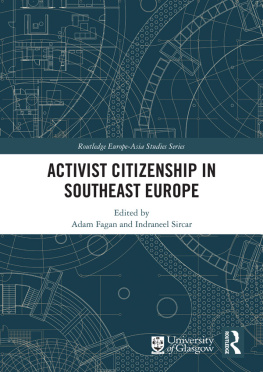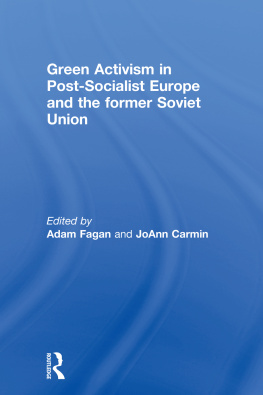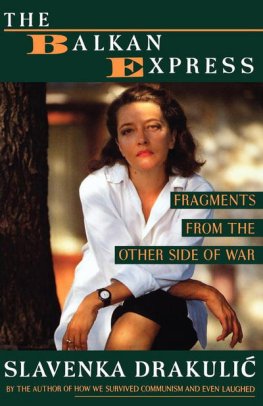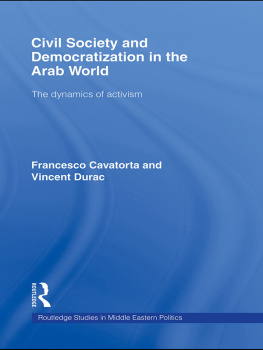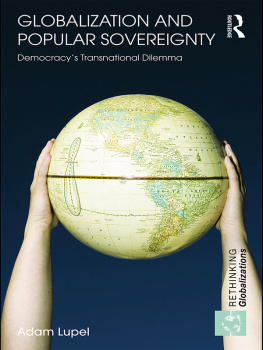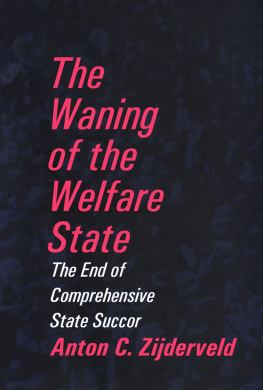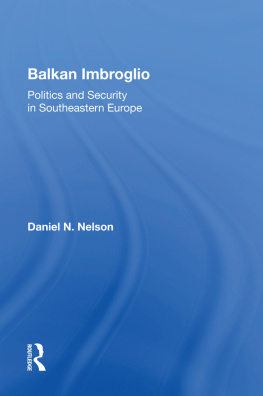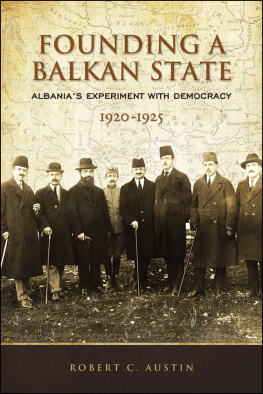Adam Fagan is Professor of European Politics at Queen Mary, University of London. He is a specialist on Central and Eastern Europe and the Balkans and is the author of Environment and Democracy in the Czech Republic.
Europes Balkan Dilemma

New paperback edition published in 2012 by I.B.Tauris & Co Ltd
6 Salem Road, London W2 4BU
175 Fifth Avenue, New York NY 10010
www.ibtauris.com
Distributed in the United States and Canada Exclusively by Palgrave Macmillan
175 Fifth Avenue, New York NY 10010
First published in hardback in 2010 by I.B.Tauris & Co Ltd
Copyright 2010, 2012 Adam Fagan
The right of Adam Fagan to be identified as the author of this work has been asserted by the author in accordance with the Copyright, Designs and Patents Act 1988.
All rights reserved. Except for brief quotations in a review, this book, or any part thereof, may not be reproduced, stored in or introduced into a retrieval system, or transmitted, in any form or by any means, electronic, mechanical, photocopying, recording or otherwise, without the prior written permission of the publisher.
ISBN: 978 1 78076 406 1
eISBN: 978 0 85773 638 3
A full CIP record for this book is available from the British Library
A full CIP record is available from the Library of Congress
Library of Congress Catalog Card Number: available
Typeset by Swales & Willis Ltd, Exeter, Devon
Contents
Acknowledgements
This monograph is the product of extensive fieldwork undertaken in Bosnia-Herzegovina, Serbia and Kosovo between 2004 and 2008. I am most grateful to the British Academy and the Nuffield Foundation for generously funding the research and also to the Department of Politics, Queen Mary, University of London for facilitating the endeavour. The completion of this research monograph would not have been possible without the generous support of New York University in London and Professor David Ruben.
I am eternally grateful to the numerous officials, employees and activists within the civil society and NGO sectors who provided me with invaluable data and submitted to requests for interviews and information. I also have appreciated the help of EU Delegation staff within the region. Again, too many people to name, but I would like to thank Vladimir Pandurevi (Sarajevo), Jelena Milo (Sarajevo), Zorana Ivankovi (Belgrade) and John White (EAR Belgrade) for their time and support. I was also fortunate to obtain considerable help from senior staff at DG Enlargement in Brussels. In particular, the help of Mose Apelblat, Louis Hersom and Juri Laas was absolutely invaluable and much appreciated.
I would also like to thank Toby Vogel, Lejla Somun-Krupalija and Sonja Biserko for their comments, advice and encouragement. Liz Friend-Smith at I.B.Tauris deserves mention here for her considerable patience and positive encouragement. I am also very grateful to Indraneel Sircar for his assistance with aspects of the manuscript and for his insights into developments in Bosnia-Herzegovina.
However, I am in no doubt that the book would not have been written or researched without the support, love and patience of Julie, Ella, Molly and Noah Taylor. It is to you, and the memory of my dear Mother, that this book is dedicated.
Introduction
Sat in the ubiquitous pavement cafs of Belgrade, Sarajevo or Pristina, surrounded by gold star-emblazoned EU-livery advertising the latest Commission-funded development initiative, construction or pledge, it is quite easy to forget that when the European Economic Community (EEC) came into existence in 1957 it was to advance the economic interests of post-war capitalist European liberal democracies and that, until the end of the last century, external relations and foreign policy were rather minor aspects of EU activity. From the perspective of the Western Balkans in 2009, the EU looks and acts like a multilateral development agency: it funds road-building, railways and hospitals; it trains police officers, civil servants and doctors; supports community development, NGOs and substitutes for the absence of state and market provision in the realms of welfare and education. If you are a Bosnian or a Serb requiring credit or a loan to start a business, or for cancer screening or employment training the chances are the service will be delivered as part of an EU-funded scheme or programme.
How and under what circumstances did this transformation in the EUs role occur? Is the current intervention in Bosnia-Herzegovina (BiH), Serbia and now Kosovo simply an extension and refinement of earlier democracy assistance measures dating back to the late 1980s? What is the EU trying to achieve in these Western Balkan states, how effective are the strategies, and what specific challenges is the Commissions enlargement strategy confronting in this region of weak states, post-conflict reconstruction and limited democratisation? This book does not attempt to answer all such questions. What it sets out to do is consider the impact of development assistance channelled through non-governmental organisations and civil society associations in terms of realising broader political and economic objectives. The book is primarily interested in whether such intervention is helping to lay the foundations of good governance, a critical component of Europeanisation and a significant test of the EUs enlargement strategy.
The EC (European Community) initially became involved in the region as part of broader international efforts to bring peace to the successor states of the former Yugoslavia in the early 1990s. However, it is widely acknowledged that EC/EU peace and mediation initiatives for Bosnia in particular the 1992 European Community peace conference led by Jose Cutileiro and Peter Carrrington which called for the ethnic division of the territory, and later initiatives proposed by David Owen were entirely unsuccessful and contentious. From 2000 onwards the EUs role changed. Drawing in part on its successes as provider of emergency relief and reconstruction aid during and immediately after the war, the EU has subsequently engaged with the successor states in the context of the Stabilisation and Association process (SAp), with the ultimate aim of assisting the new states towards eventual membership. In essence, once the wars of Yugoslavias succession ended, EU intervention and assistance in the region was deployed in the spirit of Article 2 of the Treaty of Rome: to promote... a continuous and balanced expansion, an increase in stability, an accelerated raising of the standard of living and closer relations between the states belonging to it.
It barely needs stating that the requirements of membership represent an enormous challenge for the Western Balkan states. From the perspective of pro-EU commentators, political elites and citizens within the region, EU intervention and the requirements of the Commission are broadly perceived as necessary to transform weak states and mitigate the political, economic and social legacies of conflict and socialism. For advocates, meeting the rigid requirements set by the Commission is about Europeanisation via enlargement; it is hoped that the strategy will deliver democratic governance and ultimately membership of the EU in much the same way that it did for the Central and East European States.
Regardless of whether membership for the states of this region is desirable or the intervention appropriate, it cannot be denied that the role of the European Union in assisting the political reconstruction of Serbia and Bosnia-Herzegovina has been, and continues to be, a particularly bold and largely unprecedented endeavour. The 2 billion of aid that has been poured into Kosovo, a land of 2.4 million people, plus the proposed assistance package designed to deliver supervised statehood to the province, represents an even more ambitious assistance package, taking EU intervention in and assistance for the region to new heights. The Mission to Kosovo (EULEX), once fully operational, will confirm the Commissions status as the main development agency in the Western Balkan region and represents the most ambitious and costly foreign policy adventure in the EUs 50-year history. Indeed, not only does the scale and remit of EU assistance in these states surpass the Commissions previous intervention in the post-socialist states of Central and South Eastern Europe, it also extends significantly beyond the provision of development aid delivered by the Commission to transitional and failing states globally.


